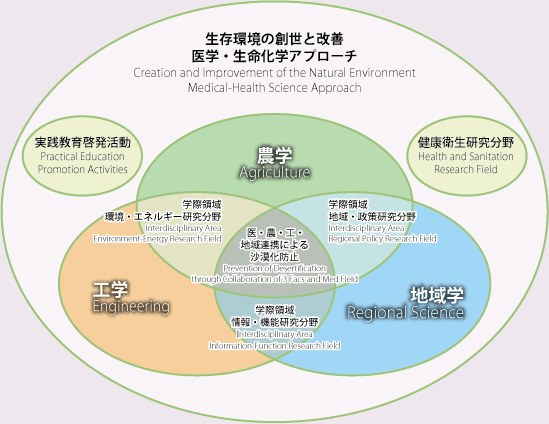Strategy University Summary
Summary
The key concept of Tottori University is “Fusion of Knowledge and Practice". With this as a guiding principle, the university has focused its international strategy on tackling the problem of desertification, a problem which is rapidly progressing on a global scale, with the aim of "building environmentally viable societies and promoting sustainable regional development". The university's international strategy is based on its efforts over many years in the fields of Regional Sciences, Medicine, Engineering and Agriculture to apply the results of education and research to the prevention of desertification. Through developing this international strategy, it aims to make a contribution at the global level to the stable and sustainable development of local regions. In order to achieve this aim, Tottori University has created a cross-faculty system of education and research as shown in the outline of the university‘s International Strategy. It has also established a "Headquarters for Planning and Promoting International Strategies" which consists of two special offices: an "International Strategy Planning Office" and an "International Strategy Promotion Office". This headquarters supports an international level of education and research to promote cooperation together with the overseas offices connected to its Information Network.

Towards a Framework for Sustainable society in Harmony with Nature −International Strategies to Prevent Desertification−

- Agriculture Approach (Application of arid land practical research to prevent desertification etc.)
- Regional Study Approach (Policy research for the formation of sustainable regions as a means of preventing desertification, etc.)
- Engineering Approach (Basic research on utilization of unused resources, such as energy, to prevent desertification , etc.)
- Medicine Approach (Fundamental research about diseases and medical treatments that are peculiar to desertification-prone areas , etc.)
- Interdisciplinary Approach
Future Directions in the Development of International Strategy
“Prevention of Desertification – Toward the Building of Sustainable Communities-” , which is the theme of our International Strategy, aims not only to prevent desertification but also to tackle such world problems as population issues, food issues, environmental issues and energy issues. These problems demand urgent action and need to be addressed on a global scale. Devising solutions to these requires long-term continuous education and research efforts at a cross – faculty level. Therefore, our international strategy aims to promote global development through activities in the fields of education and research which are planned, supported and coordinated by our newly – established “ Headquarters for Planning and Promoting International Strategies”. In this way, the university will work to strengthen its overseas focus through a campus – wide research system involving the Faculties of Regional Sciences, Medicine, Engineering and Agriculture.



